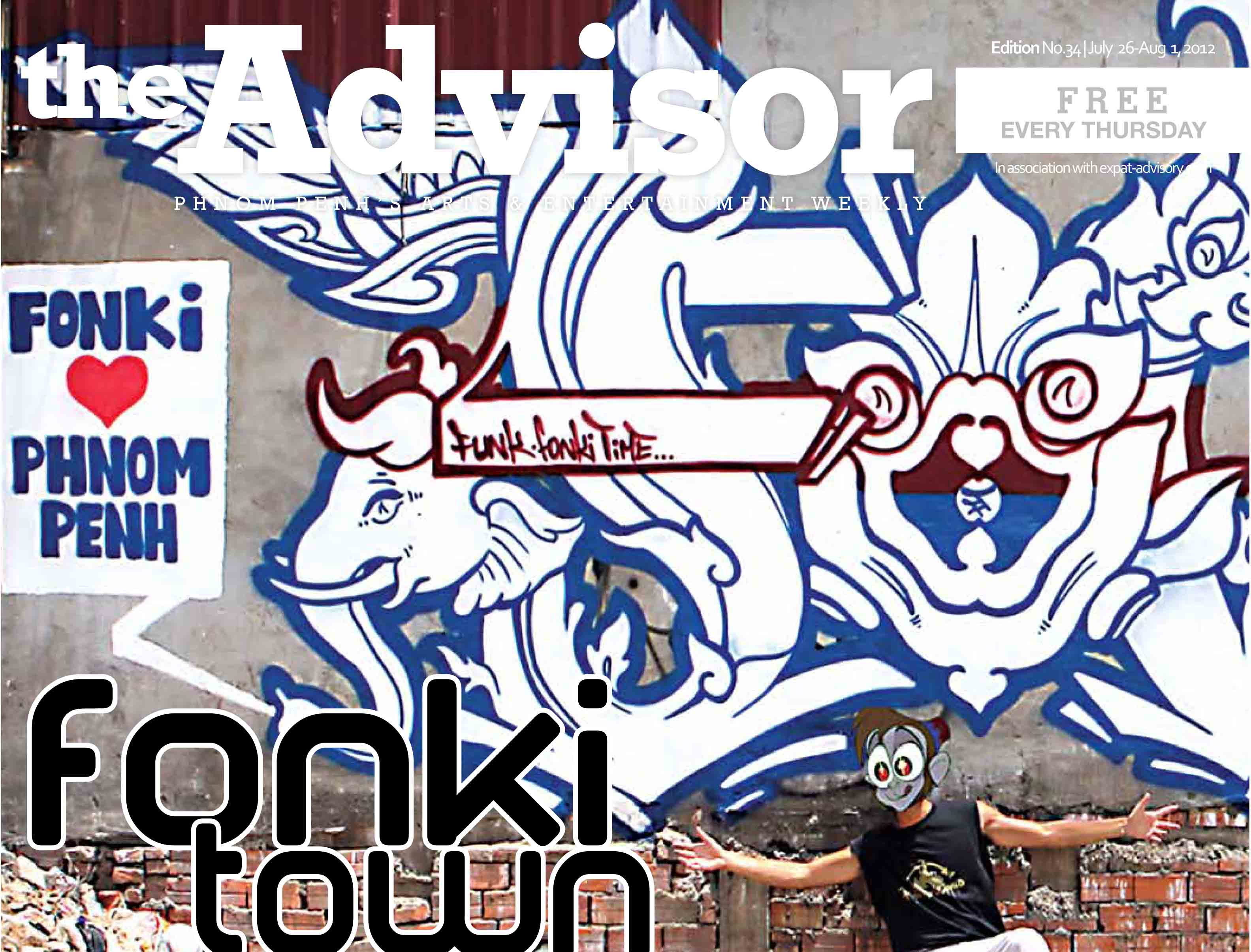On the whitewashed walls of Phnom Penh’s French Institute, something mysterious is taking shape. A wrinkled hand emerges, a smile tilts shyly for the camera, a pair of black eyes gaze unblinkingly at the street below. Faces, a family, a stippled memory wholly personal yet, paradoxically, nationally pertinent.
The normally sedate French Institute is not the only Phnom Penh structure to be lent some graffiti cred by Fonki, a Khmer-French-Canadian street artist. One month into his fourth sojourn Fonki selected a rundown section of Russian Boulevard as the locus for his initial Phnom Penh paint-up, with full and smiling permission of the building owner. Mixing rad Montreal lettering with trad Khmer kbach aesthestics of form and colour, the piece was a hit. “For me the whole process was awesome,” enthuses Fonki. “People are curious, especially the kids. You’re there for four days and you know the whole neighbourhood.”
Knowing the whole neighbourhood can have its downsides, though; the neighbourhood watchdogs know you just as intimately. Barely a week after Russian Boulevard was given its make-over, Fonki returned to find his work inexplicably white-washed. He is surprisingly sanguine about the effacement: “The chief of police, he said ‘Yeah! Do your thing!’ So I thought it was it cool. Then after a week they buffed it! But I don’t mind, you know. Graffiti is epheremal.”
Perhaps paradoxically, Fonki is using this ephemeral and oft-maligned genre to express the inescapable truths of family, nation and identity. Both the mural adorning the Institute – the largest yet in the 22-year-old’s career – and the short-lived work on Russian Boulevard (not to mention the myriad ideas gestating in Fonki’s capacious, electrifying, high-speed brain) address ideas of permanence and contemporaneity, of past and present. This is no surprise given his family history.
As Khmer Rouge troops closed in on the beleaguered capital in 1975, Fonki’s parents fled to France and then Montreal, where the young graffiti artist was born and raised. “I’d always been drawing,” he says. “My parents never complained or showed their sadness… but I could feel some of that. I couldn’t complain or be the sad guy after everything they’d been through, so I put all my energy into street art. I realised I’d always been doing graffiti but I didn’t know it!”
While innocently making his mark as the new graffiti kid on Montreal’s urban block, Fonki immersed himself in illustration, studying animation and film at Concordia University with an old friend, Jean-Sebastien Francoeur. The twosome teamed up with Andrew Marchand-Boddy, who divides his time between winning film awards and doing flip-tricks at his local skate park, and decided to make an off-the-cuff 15 minute short about Fonki’s prodigal return to Cambodia.
Several months and 80 minutes of celluloid later, Wet Paint is a bona fide feature film in progress. It follows Fonki from Montreal to Phnom Penh, spray can in hand, giving workshops to Khmer kids and revivifying the rotting walls of Phnom’s Penh’s forgotten buildings. “This is a beautiful city,” explains Fonki, “but it’s changing so fast. That’s why I had to come now. My generation is craving… something… solidarity, identity… something.”
It’s that elusive something that Wet Paint hopes to uncover, positing freestyle art as the expressive mode of choice for the post-genocide generation. And despite Phnom Penh’s notable dearth of visual street art, Fonki feels the city is poised for a distinctively Cambodian graffiti revolution: “Our culture has so much richness of form and colour, we could do so much. In the ’80s and ’90s we couldn’t move forward, we had to try to save what had been eradicated. But now I think this generation can move forward. Now, right now, we can build an identity and be proud to be Cambodian. When you paint in Cambodia, you paint your own story, sure, but you also paint the story of your family. And the story of every other family as well, and more than that.
“But hey I don’t know, I’m just a painter,” he laughs. “For sure I’m not going to save any lives with graffiti – I’m not a doctor! But there’s one thing I always say: add colour to your present if your past seems grey. When I came here and I thought about that, I thought, yeah, everybody lost someone in the genocide. But you know something? The future is now.”
Fonki’s largest ever mural will be unveiled on July 26 at the Institut Francais du Cambodge, with live music and entertainment.
WHO: Fonki
WHAT: Street art
WHERE: Institut Francais du Cambodge, St. 184
WHEN: 6:30pm July 26
WHY: Behold the awesome power of the spray can
